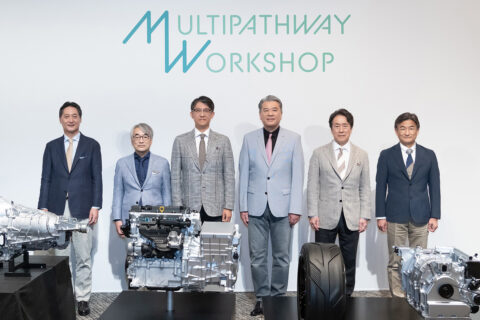
Mazda, Subaru and Toyota have committed to developing new engines in an attempt to decarbonise ICE cars, with a renewed focus on hybridisation and carbon-neutral fuels.
The allied Japanese brands jointly confirmed they would “aim to optimise” engines with electric motors, electric drive units and batteries, which goes against the trend of brands transforming entirely to EV-only line-ups.
The trio said the decision was driven by “a deep understanding of their customers’ diverse lifestyles” as well as a belief of a future for ICE.
In their pursuit of carbon neutrality, they will also “revolutionise” engine packaging.
Compact engines, they said, will mean smaller vehicles and in turn better aerodynamics and fuel efficiency, while complying with increasingly stringent emissions regulations.
The engines won’t be purely petrol-fuelled, either, as Mazda, Subaru and Toyota will also major on alternative fuels, such as biofuels, synthetic e-fuels and hydrogen.
“We will continue to offer customers exciting cars by honing internal combustion engines for the electrification era and expanding the multi-pathway possibilities for achieving carbon neutrality,” said Mazda president and CEO Masahiro Moro.
Subaru president and CEO Atsushi Osaki suggested the target of carbon neutrality was one that should be a primary focus in Japan, adding: “As we continue to refine electrification technology, we will also enhance our horizontally opposed engines with an aim to use carbon-neutral fuels in the future.
Toyota president and CEO Koji Sato said the decision would offer customers “diverse options” so they could drive carbon neutrally and described the three brand’s plans as “friendly competition”.
“In order to provide our customers with diverse options to achieve carbon neutrality, it is necessary to take on the challenge of evolving engines that are in tune with the energy environment of the future,” Sato said.
Despite this announcement, Toyota is still heavily backing EVs. It’s aiming to launch at least 30 new electric models by 2030, with the goal of selling 3.5 million EVs around the world each year.
Ten of those will be a part of the brand’s European line-up by 2025, including the Urban Crossover concept that was revealed at the end of 2023.
Smaller cars, such as the Aygo, won’t switch to electric power, as battery costs have been deemed too expensive.
Meanwhile, Mazda is targeting a spend of £8.7bn on electrifying its model line-up by 2028 and Subaru plans to have an eight-strong EV line-up by then.
